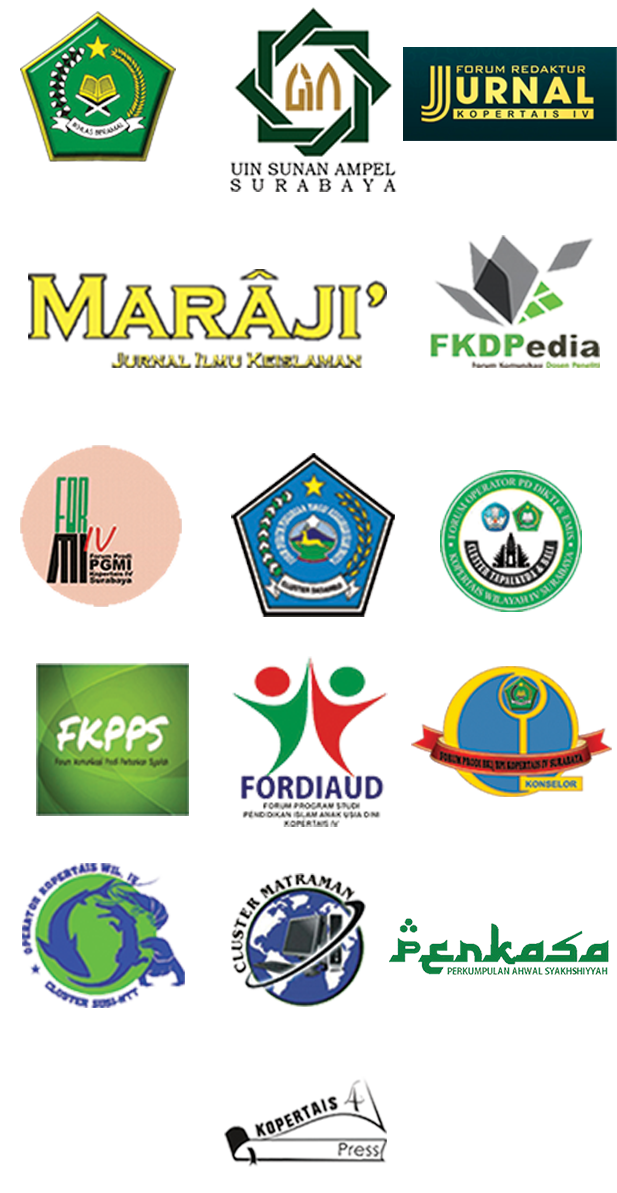Local Wisdom in The Interpretation of Religious Tolerance Verses in Tafsir Al-Ibriz By KH. Bisri Mustafa
Abstract
Tolerance is a prerequisite for building interfaith communication to create peace in Indonesia. This is because Indonesia is a plural country. The idea of tolerance is found in the interpretation of the Qur'an, including in the interpretation of al-Ibriz by KH. Bisri Mustafa. This research explores the context of local wisdom in the interpretation of tolerance verses in tafsir al-Ibriz. This research is a qualitative research with textual analysis of the tafsir. The focus of this research is on the interpretation of tolerance verses in tafsir al-Ibriz, especially on five things: believer-unbeliever interaction, no compulsion in religion, living together with people of different religions, the existence of the people of the book, and Islam as a mercy to the universe. The results of this study found that the context of local wisdom contained in tafsir al-Ibriz is found in the interpretation and analysis written in Javanese. Tafsir al-Ibriz is addressed to Muslims in general, especially Muslims in Indonesia, especially in Java. In the context of pluralism, the writing of this interpretation is also intended to ground the Qur'an to a plural society.
Downloads
References
Abdullah, Abdullah. “Wajah Toleransi Dan Perdamainan Dalam Kontestasi Historisitas.” Religious: Jurnal Studi Agama-Agama dan Lintas Budaya 2, no. 2 (30 Agustus 2018): 107–26. doi:10.15575/rjsalb.v2i2.3099.
Abideen, Zain Ul, dan Farrukh Abbas. “Believers, Islamic Brotherhood and Mosque-Based Emotional and Informal Social Support System among Muslims in Pakistan.” Journal of religion, spirituality & aging 33, no. 1 (2021): 54–85.
Affandy, Sa’dullah. “Menyoal Status Agama-Agama Pra-Islam.” Bandung: Mizan,
Al-Khathîb, Abd al-Karîm. Al-Tafsîr Al-Quranî Li Al-Quran. TK: Dâr al-Fikri, 1970.
Ar-Râzî, Fakhr. “Tafsîr al-Kabîr Mafâtih al-Ghayb.” Juz, 1981.
Baeva, Liudmila V. “Virtual Communication.” International Journal of Technoethics 7, no. 1 (Januari 2016): 51–61. doi:10.4018/IJT.2016010104.
Bariyah, Mufidatul Bariyah. “Ayat Toleransi Dalam Al-qur’an; Tinjauan Tafsir Al-
Qurthubi.” Al-Mada: Jurnal Agama, Sosial, dan Budaya 2, no. 2 (2019): 31–46.
BPS. “Badan Pusat Statistik,” 2020.
Castillo, Fides del, dan Marie Antoniette Alino. “Religious coping of selected
Filipino catholic youth.” Religions 11, no. 9 (2020): 462.
Darweish, Marwan, dan Maamoon Abdulsamad Mohammed. “History education schools in Iraqi Kurdistan: representing values of peace and violence.”Journal of Peace education 15, no. 1 (2018): 48–75.
Dinata, Muhamad Ridho. “Konsep Toleransi Beragama Dalam Tafsir Al-Qur’an
Tematik Karya Tim Departemen Agama Republik Indonesia.” ESENSIA: Jurnal Ilmu-Ilmu Ushuluddin 13, no. 1 (2012): 85–108.
Docherty, Bonnie. “A ‘light for all humanity’: The treaty on the prohibition of nuclear weapons and the progress of humanitarian disarmament.” Global
Change, Peace & Security 30, no. 2 (2018): 163–86.
Fawzan, Shalih. Al-Irshâd ila Shahîh al-‘itiqâd. Riyadh: Dâr al-Huzaemah, 1997.
Ghazali, Abd Moqsith. Argumen pluralisme agama: membangun toleransi berbasis al-
Qur’an. Kata Kita, 2009.
Ghazali, Adeng Muchtar. “Toleransi beragama dan kerukunan dalam perspektif Islam.” Religious: Jurnal Studi Agama-Agama dan Lintas Budaya 1, no. 1 (2016): 25–40.
Huda, M Thoriqul, dan Uly Dina. “Urgensi Toleransi Antar Agama dalam
Perspektif Tafsir al-Syaârawi.” Tarbiya Islamia: Jurnal Pendidikan dan Keislaman 8, no. 1 (2019): 44–60.
Juhri, Muhammad Alan. “Relasi Muslim Dan Non Muslim Perspektif Tafsir Nabawi Dalam Mewujudkan Toleransi.” Riwayah 4, no. 2 (2018): 243–64.
Klinken, Gerry van. “Citizenship and local practices of rule in Indonesia.” Citizenship studies 22, no. 2 (2018): 112–28.
Krause, Neal, dan Kenneth I Pargament. “Reading the Bible, stressful life events, and hope: Assessing an overlooked coping resource.” Journal of religion and health 57, no. 4 (2018): 1428–39.
Kusuma, Machroni, dan Mohammad Taufiq Rahman. “The role of social institutions on online business development in Cimahi, West Java, Indonesia.” Jurnal Socio-Politica 8, no. 2 (2018): 165–73.
McConnell, John M, Vincent Bacote, Edward B Davis, Eric M Brown, Christin J Fort, Tao Liu, Everett L Worthington Jr, Joshua N Hook, dan Don E Davis. “Including multiculturalism, social justice, and peace within the integration of psychology and theology: Barriers and a call to action.” Journal of Psychology and Theology 49, no. 1 (2021): 5–21.
Mehak Aggarwal Saumya Singh, Sahil Srivastava, Pammi Gauba, Mahender Singh Rawat. “Generation Gap: An Emerging Issue of Society.” International Journal of Engineering Technology Science and Research 4, no. 9 (2017): 973–83.
Misrawi, Zuhairi. Al-quran kitab toleransi. Grasindo, 2010.
Mofokeng, Thabang R, dan Mookgo S Kgatle. “Towards a decolonial hermeneutic of experience in African Pentecostal Christianity: A South African perspective.” HTS: Theological Studies 75, no. 4 (2019): 1–9.
Moniem, Aly Abdel. “The Ontology and Epistemology of Maqāṣidī-based Knowledge and Its Educational Implications: A Methodological Perspective.” Journal of Contemporary Maqasid Studies 1, no. 1 (2022): 59–78.
Panjwani, Farid, dan Lynn Revell. “Religious education and hermeneutics: the case of teaching about Islam.” British Journal of Religious Education 40, no. 3 (2018): 268–76.
Powell, Emilia Justyna. Islamic law and international law: Peaceful resolution of disputes. Oxford University Press, 2019.
Rahman, M Taufiq, dan Paelani Setia. “Pluralism in the Light of Islam.” Jurnal Iman dan Spiritualitas 1, no. 2 (2021): 204=210. doi:http://dx.doi.org/10.15575/jis.v1i2.12269.
Rahman, Taufiq. “’Indianization’of Indonesia in an Historical Sketch.” International Journal of Nusantara Islam 1, no. 2 (2013): 56–64.
Selenica, Ervjola. “Education for whom? Engineering multiculturalism and liberal peace in post-conflict Kosovo.” Southeast European and Black Sea Studies 18, no. 2 (2018): 239–59.
Sharonova, S, Nina Trubnikova, dan N Sokolova. “Interpreting religious symbols as basic component of social value formation.” European Journal of Science and Theology 14, no. 3 (2018): 117–29.
Shihab, M. Quraish. Tafsir Al Misbah Vol IV. Jakarta: Lentera Hati, 2006.
———. Tafsir al-Misbah: Pesan, Kesan dan Keserasian al-Qur’an Vl 1. Jakarta: Lentera
Hati, 2017.
———. Tafsir al-Quran al-Karim. Bandung: Pustaka Hidayah, 1997.
Sholihin, Muhammad, Hardivizon Hardivizon, Deri Wanto, dan Hasep Saputra. “The Effect of Religiosity on Life Satisfaction: A Meta-Analysis.” HTS Teologiese Studies / Theological Studies 78, no. 4 (2022): 10. doi:10.4102/hts.v78i4.7172.
Ummah, Athik Hidayatul. “The Voices of Inter-Religious Harmony.” Dalam International Symposium on Religious Literature and Heritage (ISLAGE 2021), 17–29. Atlantis Press, 2022.
Whitehead, Andrew L, dan Samuel L Perry. “Is a ‘Christian America’ a more patriarchal America? Religion, politics, and traditionalist gender ideology.” Canadian Review of Sociology/Revue canadienne de sociologie 56, no. 2 (2019): 151–77.
Yasir, Muhammad. “Makna Toleransi dalam Al-Qur’an.” Jurnal Ushuluddin 22, no. 2 (2014): 170–80.
Zamawi, Baharudin, Habieb Bullah, dan Zubaidah Zubaidah. “Ayat Toleransi Dalam Al-Qur’an: Tinjauan Tafsir Marah Labid.” Diya Al-Afkar: Jurnal Studi al-Quran dan al-Hadis 7, no. 01 (2019): 185–97.
Copyright (c) 2024 Anisatul Fikriyah Aprilianti

This work is licensed under a Creative Commons Attribution-ShareAlike 4.0 International License.









